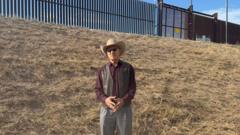In a freezing Chicago, immigrant communities are rallying in faith and solidarity ahead of Donald Trump’s return to the White House. Congregants at Lincoln United Methodist Church are holding discussions on impending deportations as the January 20th inauguration approaches, prompted by Trump’s commitment to launch potentially the biggest expulsion of immigrants in the United States' history. Reverend Tanya Lozano-Washington emphasized to her congregation, "The 20th is going to be here before we know it" as she served warm beverages to a concerned group of around 60 worshippers.
The church, embedded in Chicago's predominantly Latino Pilsen neighborhood, is a long-established center for pro-immigration advocacy. Yet, in an effort to mitigate potential threats, the church has opted for English-only services online, moving away from in-person gatherings that could attract anti-immigration protests or ICE raids. Fellow congregant David Cruseno shared, "The threat is very real," noting his mother's undocumented immigration from Mexico and her long-standing contributions to the American workforce despite her status.
Conversely, over 1,400 miles away in Texas’s Rio Grande Valley, a starkly different sentiment is surfacing regarding immigration and Trump’s policies. David Porras, a local rancher, stated, "Immigration is essential... but the right way," indicating a belief that tighter regulations could improve the situation. Local narratives reveal growing numbers of encounters with migrants, some of whom seek shelter and assistance, but also warnings about the dangers of illegal crossings and cartel violence.
The valley's demographic reality—where a significant population is comprised of first or second-generation immigrants—has started to reflect politically as well. Historically a Democratic stronghold, Starr County surprisingly swung towards Trump in the most recent election, following a nationwide trend wherein Trump captured approximately 45% of the Latino vote, a notable increase from previous elections.
Local residents articulate a desire for orderly immigration policies. Demesio Guerrero, a naturalized citizen, noted the importance of having regulations to manage who can enter the country. Many others echoed similar sentiments, asserting that their support for Trump does not equate to anti-immigrant feelings but stems from a need for structure and fairness in the system.
The Texas State Government has extended an offer to Trump for land for detention facilities, reflecting local support for more stringent immigration measures. Officials believe such developments could bolster the local economy despite concerns raised by civil rights organizations regarding potential human rights violations.
In Chicago, though, the local government continues to bolster so-called "sanctuary city" policies. Leaders, including Mayor Brandon Johnson, have resisted proposals to cooperate with federal immigration authorities, even as Trump’s allies predict a spike in ICE activity aimed at apprehending undocumented individuals. Leaders like Rev. Emma Lozano worry about the impacts on families—expressing fears for those in danger of deportation and exploring community strategies for support.
The Chicago and Texas responses exemplify how immigrant dynamics in America have evolved, reflecting wider political rifts and differing beliefs about how to navigate immigration in a rapidly changing landscape. In preparation for the challenges ahead, communities are taking proactive measures—working on legal education, creating contingency plans, and using technology to support individuals potentially targeted by the new administration’s policies.
The church, embedded in Chicago's predominantly Latino Pilsen neighborhood, is a long-established center for pro-immigration advocacy. Yet, in an effort to mitigate potential threats, the church has opted for English-only services online, moving away from in-person gatherings that could attract anti-immigration protests or ICE raids. Fellow congregant David Cruseno shared, "The threat is very real," noting his mother's undocumented immigration from Mexico and her long-standing contributions to the American workforce despite her status.
Conversely, over 1,400 miles away in Texas’s Rio Grande Valley, a starkly different sentiment is surfacing regarding immigration and Trump’s policies. David Porras, a local rancher, stated, "Immigration is essential... but the right way," indicating a belief that tighter regulations could improve the situation. Local narratives reveal growing numbers of encounters with migrants, some of whom seek shelter and assistance, but also warnings about the dangers of illegal crossings and cartel violence.
The valley's demographic reality—where a significant population is comprised of first or second-generation immigrants—has started to reflect politically as well. Historically a Democratic stronghold, Starr County surprisingly swung towards Trump in the most recent election, following a nationwide trend wherein Trump captured approximately 45% of the Latino vote, a notable increase from previous elections.
Local residents articulate a desire for orderly immigration policies. Demesio Guerrero, a naturalized citizen, noted the importance of having regulations to manage who can enter the country. Many others echoed similar sentiments, asserting that their support for Trump does not equate to anti-immigrant feelings but stems from a need for structure and fairness in the system.
The Texas State Government has extended an offer to Trump for land for detention facilities, reflecting local support for more stringent immigration measures. Officials believe such developments could bolster the local economy despite concerns raised by civil rights organizations regarding potential human rights violations.
In Chicago, though, the local government continues to bolster so-called "sanctuary city" policies. Leaders, including Mayor Brandon Johnson, have resisted proposals to cooperate with federal immigration authorities, even as Trump’s allies predict a spike in ICE activity aimed at apprehending undocumented individuals. Leaders like Rev. Emma Lozano worry about the impacts on families—expressing fears for those in danger of deportation and exploring community strategies for support.
The Chicago and Texas responses exemplify how immigrant dynamics in America have evolved, reflecting wider political rifts and differing beliefs about how to navigate immigration in a rapidly changing landscape. In preparation for the challenges ahead, communities are taking proactive measures—working on legal education, creating contingency plans, and using technology to support individuals potentially targeted by the new administration’s policies.




















